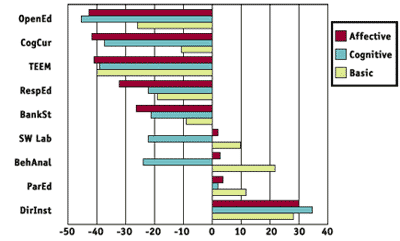Have you figured it out yet?The study was sponsored by the International Association for the Evaluation of Educational Achievement (IEA) and coordinated by High/Scope Educational Research Foundation. Results of the study, which will appear in the Fall 2006 issue of the Early Childhood Research Quarterly, identified four teaching practices that were consistently related to child outcomes across all 10 countries that had data at age 7. Controlling for family and cultural influences, researchers found the following:
1. Children's language abilities are enhanced when early childhood teachers allow them to choose many of their activities on their own.
2. Children fare significantly better in language skills development with teachers who have achieved a higher level of education.
3. Children's thinking skills improve when they spend less time participating in activities as a whole group.
4. The more equipment and materials available in preschool settings, the better the outcome in terms of children's cognitive performance.
Researchers from the Michigan-based High/Scope Educational Research Foundation coordinated the project, in collaboration with colleagues from Finland, Greece, Hong Kong, Indonesia, Ireland, Italy, Poland, Spain, Thailand, and the U.S.
[snip]
High/Scope was founded in 1970 by David Weikart, who launched the groundbreaking High/Scope Perry Preschool Study. Initiated in 1962 and lasting over 40 years, the study found that a high quality early childhood program exerts a dramatic impact on the lives of poor children, improving their educational success, increasing their adult earnings, reducing their criminal activity, and returning nearly $13 to taxpayers for every dollar invested in the program. High/Scope's educational model, in which children plan, do, and review their own learning activities, has been validated by longitudinal research studies and has influenced a generation of educators and policy makers. An independent nonprofit research and development organization, High/Scope has helped lead worldwide educational reform through its evaluative research, curriculum development, teacher training, publishing, and communication.
It "showed" child-centered constructivism being superior. Child-centered learning is wholesome and good. Educrats like child-centered. Journalists, being idiots, will jump all over it.
But, did you notice who did the research --High/Scope Educational Research Foundation. And, did you notice what they were doing research on -- the High/Scope program.
Journalists, being idiots, won't notice this potential bias. Nor, will they do any background research which would show that when High/Scope was actually researched in an independent study, Project Follow Through, it performed significantly worse than the control group and embqarrassingly worse than the winner, Direct Instruction. High/Scope is listed as "CogCur" on the following chart.
 Odd, that a curriculum that purports to be able to increase cognitive ability had some of the lowest cognitive scores. Giggle.
Odd, that a curriculum that purports to be able to increase cognitive ability had some of the lowest cognitive scores. Giggle.Funny how the only time High/Scope gets positive results is when they
It won't be the last time either.
3 comments:
Good information. I will remember this when it appears in my hometown to justify yet another foray into constructo-land.
For the image:
padding-right="15px"
3. Children's thinking skills improve when they spend less time participating in activities as a whole group.
Interesting. Group work isn't good.
4. The more equipment and materials available in preschool settings, the better the outcome in terms of children's cognitive performance.
My guess is that this is a socio-economic effect. The children of richer parents have both better outcoems and more equipment and material available.
Post a Comment